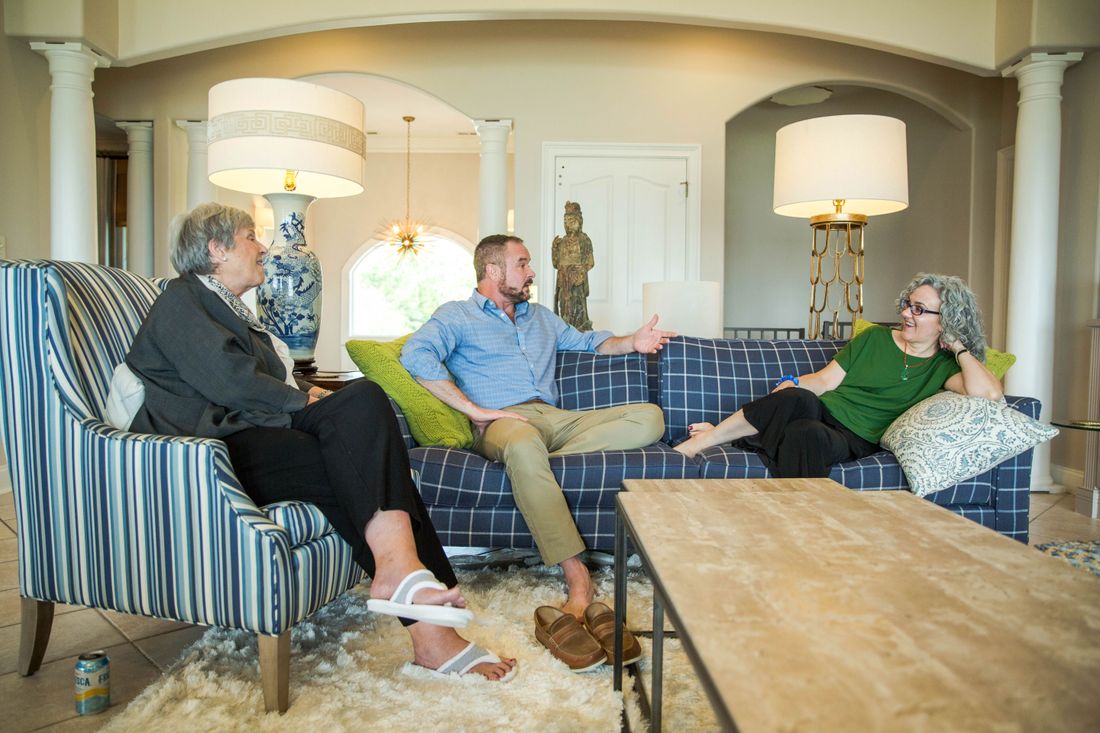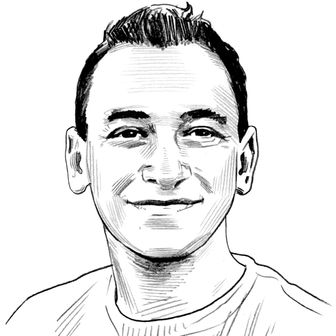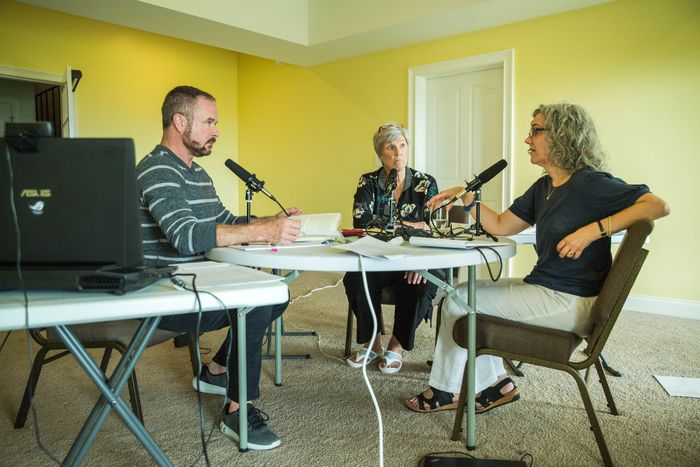
For Matthew Quick, the author of Silver Linings Playbook, 2020 was the third year of a crippling writerÔÇÖs block. Long runs near his home, in the woods of North CarolinaÔÇÖs Outer Banks, werenÔÇÖt helping. Nor was spending eight hours glued to his office chair every day. Writer friends were generous with their support at first but eventually became nervous about catching the bug themselves. An ongoing battle with depression and anxiety only made matters worse. In desperation, Quick even hired a creativity coach. It didnÔÇÖt go well.
Then, one day, his wife suggested he listen to an episode of This Jungian Life, a podcast where three Jungian psychoanalysts ÔÇö Joseph Lee, Lisa Marchiano, and Deborah Stewart ÔÇö playfully apply the insights of Swiss psychiatrist Carl Jung to modern topics: burnout, scam artists, hookup culture, the Grinch. Quick listened on his next run ÔÇö and couldnÔÇÖt stop listening for the next two months. ÔÇ£Almost immediately, the show gave me a vocabulary for things that I intuitively understood about myself but had never been able to verbalize,ÔÇØ he remembers. ÔÇ£I suddenly had a framework that felt really helpful ÔÇö and profound.ÔÇØ When he ran out of back episodes to listen to (one on A Christmas CarolÔÇÖs Ebenezer Scrooge was an early favorite), Quick found himself a Jungian analyst of his own. Soon, the writing came back. And last November, We Are the Light ÔÇö his first novel since the block (featuring, it just so happens, a Jungian analyst) ÔÇö was published.
When it comes to the fathers of psychoanalysis, Jung is less of a household name than Freud, but if youÔÇÖve ever used the words introvert or extrovert, talked about someone having a complex or persona, or taken a Myers-Briggs test, youÔÇÖve encountered his ideas. As with the Freudians, training to become a Jungian analyst is extremely involved, requiring hundreds of hours in personal analysis and at least five years of study, which is how the hosts of This Jungian Life first met ÔÇö during the early 2000s in training seminars at the Philadelphia Ethical Society.
ÔÇ£I can still remember exactly where Deb was sitting in the room,ÔÇØ Marchiano recalls. ÔÇ£I liked her right away and felt certain that we were going to become good friends. Though I was frustrated over the subsequent months because she didnÔÇÖt seem to have the same intuition.ÔÇØ The friendship eventually did blossom, and when Lee showed up, the three became ÔÇ£kind of a core because we just had so much fun together,ÔÇØ remembers Marchiano. ÔÇ£Of course, we were talking about ideas and presenting cases, but we also would just gossip and make irreverent jokes.ÔÇØ After getting certified, the three went their separate ways. ÔÇ£It was such a loss because we werenÔÇÖt in this intense container anymore,ÔÇØ Marchiano remembers. ÔÇ£WeÔÇÖd meet for dinner sometimes and have calls, but I was always lonely for that feeling.ÔÇØ
Eager to get it back, in early 2016, Marchiano asked the others if theyÔÇÖd be willing to try recording a podcast, and the three committed to each other for a year. ÔÇ£None of us thought it was going to be hugely successful, but we knew we wanted to talk to average people who didnÔÇÖt necessarily know anything about Jung and to really make his ideas accessible,ÔÇØ Lee explains. ÔÇ£There are plenty of online lectures that are very erudite and sophisticated from Jungian scholars, but we wanted to reach people in Peoria. To take struggles that are relevant to everyoneÔÇÖs lives, like procrastination, and add some depth, but without overwhelming people. We just wanted to be a welcome mat to these ideas.ÔÇØ Or in StewartÔÇÖs words, ÔÇ£Your safe guides into the underworld.ÔÇØ
Their timing proved fortuitous. In recent years, the rise of therapy as entertainment, from productions like Couples Therapy and Jonah HillÔÇÖs Stutz to the continued ascent of Esther Perel and TikTokers like Therapy Jeff, has coincided with a returning appreciation for psychoanalysis, born out of a growing skepticism that the mainstream therapeutic approach today ÔÇö cognitive-behavioral therapy ÔÇö is too focused on a quick, thought-deflecting fix. After only a month of episodes (titles include ÔÇ£Shithole,ÔÇØ ÔÇ£Hookups,ÔÇØ and ÔÇ£Emotional AffairsÔÇØ), the This Jungian LifeÔÇÖs hosts were receiving a stream of emails from listeners as far afield as Estonia, Morocco, and Suriname, thanking them for the light-hearted way they were breaking down JungÔÇÖs ideas. (Reading him alone is a little harder: One analyst says that trying to find JungÔÇÖs take on a specific subject can feel like ÔÇ£diving into the Indian Ocean,ÔÇØ as there are 20 volumes of the collected works, ÔÇ£all in tiny font with notes.ÔÇØ)
ÔÇ£It caught fire almost right away,ÔÇØ remembers Marchiano. ÔÇ£IÔÇÖll never forget: We started that April, and by June, we had 10,000 downloads. Now, we have around 10 million. I remember being completely shocked, thinking, Wow, this has legs I did not expect it to have.ÔÇØ
Today, the show averages around 30,000 listeners per episode. At the last meeting of the International Association for Analytical Psychology in Vienna (something like the Jungian Coachella), Marchiano and Stewart were ÔÇ£more or less mobbed,ÔÇØ one analyst told me. ÔÇ£It was like, ÔÇÿOh my God, youÔÇÖre the people who do TJL!ÔÇÖÔÇØ Every month, there seems to be a constant stream of celebrities ÔÇö Russell Brand (on Dua LipaÔÇÖs podcast), Emma Cline (on How Long Gone), Kate Berlant, Angelica Ross ÔÇö who go out of their way to talk about the showÔÇÖs impact on them. And itÔÇÖs in the air in New York, too: I heard about it first from Passerby magazine founder Cl├®mence Pol├¿s, then from a close friendÔÇÖs father who was mainlining the show on drives between the city and New Hampshire, then again at a dinner party, where our host explained that her options for that evening had been between cooking for all of us, or ÔÇ£sitting with a bottle of wine, crying to This Jungian Life.ÔÇØ
Of course, a podcast can only provide so much analysis; many listeners have been finding themselves in live sessions. In conversations with Jungian analysts around the world, it became clear that the success of This Jungian Life is doing its part in filling their practices and that training applications have also soared. Martha Blake, an analyst in Portland, Oregon, says that sheÔÇÖs sent notes to the hosts thanking them for her many new referrals (her practice is now full). Christina Becker, a Jungian analyst in Toronto, was a guest on the podcast and says that as soon as her episode aired, she had ÔÇ£tons, tons, tonsÔÇØ of listeners from as far afield as France, Ireland, and New Zealand, writing to her for virtual sessions. Jane Penrod, an analyst in Albuquerque, New Mexico, says the show has led clients to her door, many of whom top up their sessions by tuning into each new episode and bringing back related personal material. Wendy Jones, co-president of the CG Jung Institute of New York, says that over the past few years, the institute has enjoyed ÔÇ£a heightened interestÔÇØ in its training program and that This Jungian Life has been one catalyst. Stephen Martin, an analyst in Narberth, Pennsylvania, who trained in Zurich with some of JungÔÇÖs own students and co-founded the Philadelphia Jung Seminar, described the podcast as ÔÇ£miraculous ÔÇö and singularly helpful in generating interest in our seminar, with considerably more applications.ÔÇØ
Chicago-based Jungian analyst Gus Cwik, who has had patients come to him after listening to the podcast, put it plainly: Marchiano, Stewart, and Lee have become the ÔÇ£rock stars of the Jungian world.ÔÇØ
When I put this to the hosts, Marchiano laughs. ÔÇ£Jungian rock star is kind of a contradiction in terms. WeÔÇÖre a tweedy, introverted, low-profile bunch, so thatÔÇÖs kind of a funny metaphor.ÔÇØ Stewart counters: ÔÇ£I think we definitely are out there in a way that is not typical for Jungian analysts, so to our colleagues, we must look like blazing extroverts,ÔÇØ she says. ÔÇ£But really, weÔÇÖre just three people having a conversation every week about something that we feel matters.ÔÇØ
Since the beginning, each episode of the series has been produced the same way: Ahead of time, a topic is chosen ÔÇö anything from road trips to gambling to stay-at-home dads to Puss in Boots, as long as the hosts all agree itÔÇÖs fertile ground for a Jungian reading ÔÇö and the three separately prepare notes on the subject, tying the stresses of 2023 to psychoanalytic ideas from 1923. Episodes are recorded on Monday mornings, and once theyÔÇÖve wrung everything out of the topic at hand over the course of a banter-filled, hour-long discussion, theyÔÇÖll close by analyzing a new listener-submitted dream. (At this point, Marchiano says they have ÔÇ£thousands and thousandsÔÇØ of dreams in their inbox to sift through.)
Their expertise on a niche subject aside, part of the reason fans say the show works so well is because,┬álike so many other successful podcasts, itÔÇÖs simply enjoyable to be included in a warm conversation between close friends whoÔÇÖve known each other forever. ÔÇ£They laugh a lot, and theyÔÇÖre all so comfortable listening to each other ÔÇö no one is trying to persuade the other that itÔÇÖs actually like this or that,ÔÇØ one analyst-in-training, who came across the show while studying in Vienna, explains. (ÔÇ£If you join a Jungian study WhatsApp group,ÔÇØ she added, ÔÇ£someone is going to come up with a link to the show eventually.ÔÇØ)
While the laughter and relaxed conversation of the hosts might seem to clash with the stereotype of the pensive analyst on their black leather chair, Cwik says itÔÇÖs in line with JungÔÇÖs own approach. ÔÇ£Jungian analysis is different from Freudian psychoanalysis, which uses the couch and the analyst sitting behind a person. Jung always talked about more face-to-face meetings and being actively engaged with the person. I think what theyÔÇÖve been providing is a three-point dialectic.ÔÇØ
Proving CwikÔÇÖs point, many of the This Jungian Life fans I spoke to described their first time listening to the show as a soothing, therapeutic experience and typically offered the same two reasons as to why. First, because JungÔÇÖs theories were explained in a way that immediately resonated with their own struggles. And second, because in the scary moment where they now had a name for what had been eating at them, the hostsÔÇÖ tones were ones of both acceptance and humor, suggesting that all was not lost and help was at hand.
ÔÇ£It wasnÔÇÖt a kick in the face or an implication that I was an awful person,ÔÇØ Quick, the author, remembers. ÔÇ£It was just, letÔÇÖs take a look at these things, and maybe they might be useful to you in some way. It was a beautiful invitation to look in the mirror.ÔÇØ Art professional Laura Rivera-Ayala (favorite episode: ÔÇ£Jonah and the WhaleÔÇØ) experienced a similar feeling: Unfulfilled at her corporate job, sheÔÇÖd started listening while experiencing ÔÇ£a lot of panic and anxietyÔÇØ and credits the show with giving her the confidence to leave that job, and even move cities. ÔÇ£Their tone is this constant reminder that thereÔÇÖs a way forward. It was just so soothing.ÔÇØ
Flavius Ardelean-Bachmann also changed his life after listening. In the fall of 2019, he was working in Germany for IBM when suddenly it ÔÇ£all came to a stop very violently, and I had a breakdown.ÔÇØ He began to look into what his unusually intense dreams might be telling him, which led him to the podcast. ÔÇ£I started listening and never stopped,ÔÇØ he says. ÔÇ£Through sleepless winter nights, they became my friends and helped me find my way out.ÔÇØ HeÔÇÖs now happy in a new career as a novelist but plans to later train as a psychoanalyst.
Lee, Marchiano, and Stewart are now in high demand as psychanalysts themselves. Interest in their respective practices has exploded, and their waiting lists have become ÔÇ£irresponsibly long,ÔÇØ Lee says. As for the trioÔÇÖs next steps: While theyÔÇÖre determined to keep the podcast free, theyÔÇÖve since expanded it into a year-long, paid, virtual ÔÇ£Dream School,ÔÇØ complete with office hours. ÔÇ£ItÔÇÖs a real commitment that dives deeply into teaching people how to work with their own dreams, involving a lot of contact with us throughout and with fellow students,ÔÇØ Marchiano explains. TheyÔÇÖve also signed a contract to deliver a book next year, and thereÔÇÖs still no shortage of future episode ideas to think about, whether generated by listeners (the hosts tend to ignore frequent requests to get into politics, but are planning to address JungÔÇÖs murky response to the rise of Nazism) or by their own clinical practice (an upcoming episode on wedding anxiety, for example, was inspired by MarchianoÔÇÖs work with one of her own clients).
All in all, theyÔÇÖre just hoping to keep the Jung train rolling. ÔÇ£There was a resurgence around JungÔÇÖs ideas in the 1990s, which was when I found him,ÔÇØ Marchiano remembers, citing books like Clarissa Pinkola Est├®sÔÇÖs recently reissued Women Who Run With the Wolves, Thomas MooreÔÇÖs Care of the Soul, and James HillmanÔÇÖs A Blue Fire. ÔÇ£Public interest in Jung tends to bubble up every couple of decades, so to think that we may be a part of another moment, given that our personal mission is to popularize JungÔÇÖs ideas, certainly tickles me.ÔÇØ
One person whoÔÇÖs joined them in that mission is Quick, who on his book tour this year for We Are the Light has been going into detail about how Jungian analysis changed his life. ÔÇ£I famously did not like being in public very much,ÔÇØ he remembers. ÔÇ£I would go to airports with my hood up and my sunglasses on and my earbuds in, hiding from a world that seemed really hostile. But after listening to This Jungian Life for almost three years, and two and a half years of analysis, I go to the airport now with no sunglasses, no hood, smiling at people, interacting, and the world just seems a lot brighter. Everyone got nicer. And IÔÇÖve realized that itÔÇÖs not that those people were mean three years ago. ItÔÇÖs that I was different. ThatÔÇÖs new, humbling, and exciting. And I donÔÇÖt think I would have ever gotten there if it hadnÔÇÖt been for the show.ÔÇØ



